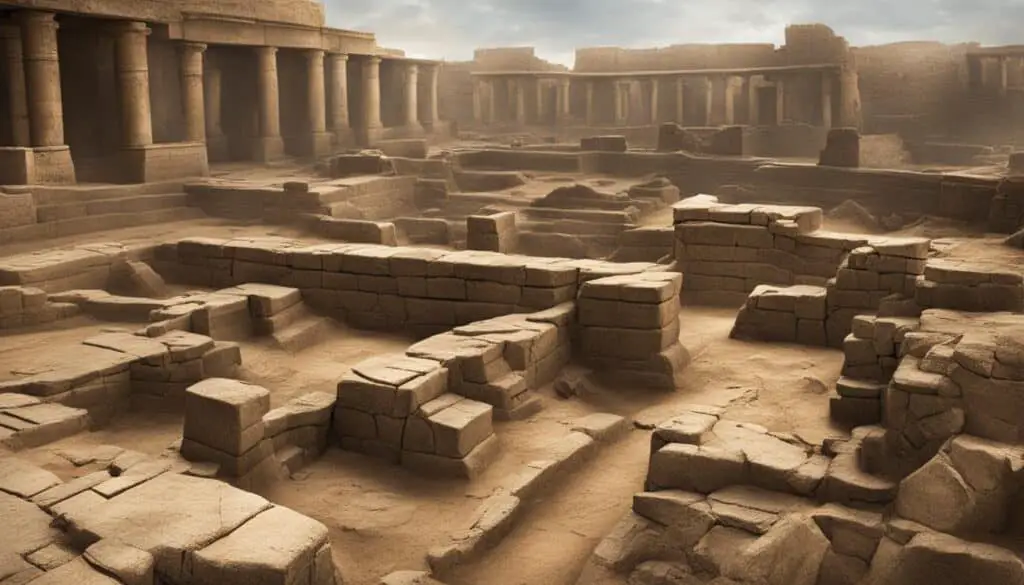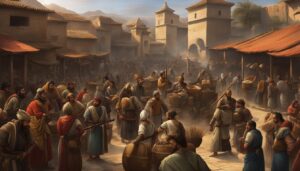
The Bible contains a wealth of accounts detailing ancient military conflicts and battles. These narratives, found throughout the Old and New Testaments, provide historical insights into warfare in the Bible and offer theological perspectives on the role of faith, divine intervention, and justice. From epic clashes between ancient powers to smaller-scale skirmishes, these war stories in the Bible shed light on military strategies, armed conflicts, and the impact of historical events on religious beliefs.
Key Takeaways:
- Military conflicts in the Bible provide historical and theological insights.
- Biblical narratives showcase the power of faith and divine intervention.
- These war stories reveal the political and military dynamics of the ancient world.
- Archeological evidence contributes to a deeper understanding of biblical warfare.
- Theological lessons can be drawn from these narratives, emphasizing faith, trust, and justice.
Archeological Evidence and Historical Context of Biblical Warfare
Archeological evidence plays a crucial role in uncovering the historical context of ancient warfare described in the Bible. Excavations at sites like Jericho and Ashkelon have provided valuable insights into the cities and civilizations mentioned in the biblical narratives. While debates persist regarding the timing and accuracy of certain events, these discussions contribute to a deeper understanding of ancient military campaigns and strategies.
The discovery of a large cemetery in Ashkelon, a city under Philistine control, holds the potential to reveal more about the Philistines and their interactions with the Israelites. This archeological find offers a glimpse into the lives and customs of this ancient people, shedding light on their military practices and societal dynamics. Additionally, cuneiform tablets found in Iraq have provided historians with valuable information about Jewish exiles in Babylonia and how they adapted to their new environment.
Archeological evidence continues to enrich our understanding of biblical warfare by corroborating, challenging, or expanding upon the narratives presented in ancient texts.
By examining the archeological evidence and placing it within the historical context of the ancient Near East, scholars have been able to gain a more comprehensive understanding of the military conflicts described in the Bible. These discoveries not only contribute to our knowledge of ancient warfare but also help us to appreciate the complexities and dynamics of the biblical world.

Archaeological Findings: Insights into Ancient Battles
| City | Findings |
|---|---|
| Jericho | Excavations revealed evidence of ancient fortifications and destruction, sparking debates about the events depicted in the biblical account of Joshua’s conquest of the city. |
| Ashkelon | The discovery of a vast cemetery shed light on Philistine burial customs and provided insights into their culture and interactions with neighboring civilizations. |
| Babylonia | Cuneiform tablets unearthed in Iraq offered valuable insights into the lives of Jewish exiles during the Babylonian captivity. |
Theological Perspectives and Lessons from Biblical Warfare
The military conflicts depicted in biblical narratives offer more than just historical accounts; they provide valuable theological perspectives and lessons for believers. These stories delve into the realm of religious beliefs, divine intervention, faith, justice, and peace, offering guidance and insights into navigating conflicts.
One recurring theme is the remarkable power of God and the importance of trust and obedience. The dramatic parting of the Red Sea and the miraculous fall of Jericho exemplify the divine intervention that occurs when individuals put their faith in God’s guidance. These narratives teach us that even in the face of seemingly insurmountable challenges, unwavering faith can bring about extraordinary outcomes.
Moreover, the battles against the Philistines underscore the consequences of faith and divine favor. These accounts highlight the correlation between unwavering trust in God and favorable outcomes, as well as the dangers of disregarding divine guidance. They remind us that our actions and decisions have real consequences, emphasizing the importance of aligning ourselves with God’s will.
The conflicts between Israel and Judah, on the other hand, reflect the divisions and conflicts that can arise within a community. These stories serve as cautionary reminders of the consequences of disunity and the importance of striving for harmony, justice, and peace. They challenge us to examine our own relationships and seek paths of reconciliation and understanding.
Finally, the Assyrian siege on Jerusalem and the Babylonian conquest raise profound questions about justice, peace, and the consequences of disobedience. These narratives prompt us to reflect upon the consequences of our actions, individually and collectively, and to consider the impact they may have on our relationship with God and with others.
Overall, the theological perspectives and lessons derived from biblical warfare narratives are profound. They encourage us to examine our beliefs, trust in divine guidance, pursue justice and peace, and consider the consequences of our actions. These stories serve not only as lessons from the past but also as a source of inspiration and guidance for navigating the challenges we face today.
FAQ
Are the military conflicts described in the Bible historically accurate?
While there may be debates and uncertainties surrounding the historicity of certain events, the accounts of wars and battles in the Bible provide valuable historical and theological insights into ancient civilizations and warfare.
What archaeological evidence supports the military conflicts described in the Bible?
Excavations at various sites, such as Jericho and Ashkelon, have provided insights into the cities and civilizations mentioned in the Bible. The discovery of artifacts and the examination of ancient structures contribute to our understanding of ancient military campaigns and strategies.
What theological perspectives can be gained from the depiction of military conflicts in biblical narratives?
The stories of military conflicts in the Bible highlight the role of religious beliefs, divine intervention, and faith in the face of adversity. They offer lessons on trust, obedience, consequences of actions, justice, and peace.
How do the biblical accounts of military conflicts reflect the historical context of the ancient Near East?
By examining the archaeological evidence and placing it within the historical context of the ancient Near East, we can gain a better understanding of the political, military, and cultural dynamics of that time. This understanding helps us interpret the biblical narratives in their historical context.
What can we learn about ancient warfare and military strategies from the biblical accounts?
The biblical narratives offer insights into ancient warfare, strategies, and the impact of historical events on religious beliefs. They provide glimpses into military tactics, conquests, and the dynamics of power in the ancient world.








